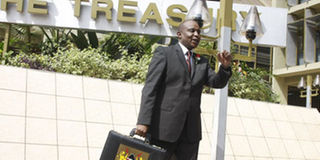China’s conditions that saw birth of railway levy

PHOTO | FILE Finance Cabinet Secretary Henry Rotich outside the Treasury on Budget Day.
What you need to know:
- The introduction of the railway development levy was one of the very rare cases where the government introduced a completely new tax
- The gigantic project may force the government to introduce many unpopular taxes
When finance Cabinet Secretary Henry Rotich introduced a railway development levy during his budget speech, many observers did not see the connection between this and the conditions Chinese lenders have demanded for financing the Mombasa to Nairobi rail project.
Indeed, the introduction of the railway development levy was one of the very rare cases where the government introduced a completely new tax dedicated to funding a specific infrastructure project.
It will be charged at the rate of 1.5 per cent of the value of all freight passing through the port of Mombasa from which the government plans to raise Sh15 billion.
This in addition to Sh22 billion which has been allocated for the project in the current financial year.
STRINGENT CONDITIONS
Concerned that the standard gauge railway - when completed - might not raise enough revenue to cover its expenses and to repay the loans, the Chinese have imposed very stringent conditions.
According to minutes between top government officials and visiting Exim Bank officials in May, the Chinese demanded additional financial guarantees to back the loan commitment.
The minutes show, for instance that Chinese demanded that the government should immediately set up multiple escrow accounts in international banks where money to repay of interest and principal of the massive loan is to be deposited.
Led by the vice-president of China Exim Bank, Mr Zhu Xin Qiang, bank officials also demanded that money deposited in the escrow accounts must be of an equivalent to pay one year interest and principal of the loan.
Even more stringent, and they wanted an arrangement whereby the Standard Gauge Railway- when completed- will more or less have guaranteed business.
TRAFFIC AGREEMENT
Specifically, they insisted that the government makes a traffic agreement between Kenya Ports Authority and Kenya Railways corporation- committing the port authority to provide sufficient volumes of cargo to the standard gauge railway when it is finally built.
They also demanded evidence of land and way-leave agreements where the new railway line will pass.
Finally, the Chinese demanded that the government put in place a railway development fund.
Whether the government will manage to deliver this project within President Kenyatta’s first term of office remains to be seen.
What is clear is that the gigantic project may force the government to introduce many unpopular taxes.





